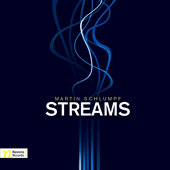Classical Album Review: Martin Schlumpf’s “Streams”
By Jonathan Blumhofer
Concertos of Martin Schlumpf, Martin Schlumpf (Navona Records)
Martin Schlumpf is one of the leading figures in Swiss contemporary music, with a career that focuses on “the borderlands between improvisation and composition.” And three of his major scores since 1994 are the focus of Navona Records’ new album, Concertos of Martin Schlumpf.
No one is going to confuse Schlumpf’s Mouvements (1994/rev. 1999) for piano and orchestra with Stravinsky’s masterpiece of the same name. For one thing, Schlumpf’s musical language is not nearly as severe as Stravinsky’s radical approach to Serialism. Also, Schlumpf’s orchestration includes prominent writing for certain instruments (like the marimba) that Stravinsky never (or rarely) touched. Throughout Mouvements’ twenty-minute duration, though, there’s a sense that the music isn’t living up to the expectations Schlumpf sets out for it.
There’s a lot going on: Schlumpf’s orchestration is often dense and at times continuously busy. He’s not afraid to jump between materials that contrast violently with each other (such relationships, in fact, form the basis of the work’s third movement). There are plenty of engaging sounds (the first movement is built on a riff reminiscent of Ravel’s Bolero; the second features some atmospheric, jazzy writing for solo piano). But it doesn’t really add up to a satisfying whole. It’s as though Schlumpf is showcasing all his technical abilities and, while that carries the piece for a while, the thinness of its materials becomes apparent both as the work progresses and repeated listening doesn’t much alter that perception.
More successful is Waves (2002), a five movement concerto for cello, trumpet, orchestra, and computer-generated sounds. There’s plenty of unpleasant music for and with electronics, but Schlumpf manages to integrate the computer-generated sounds in generally surprising and ear-catching ways – only at the very end does he resort to a kind of stock, electronic music device that isn’t quite as convincing as what came before.
As in Mouvements, there are many references: to jazz, world music, the late-20th century avant-garde, and so forth. But Waves is shorter than Mouvements and it doesn’t overstay its welcome. There’s something particularly fascinating about Schlumpf’s use of the computer throughout the piece: sometimes its sounds recall traditional African instruments, sometimes Balinese gamelan. In the context of a recording, the computer doesn’t really draw attention to itself; rather, it becomes a colorful, evocative member of the orchestra.
To these ears, the strongest piece on this disc, though, is Streams, for the odd pairing of clarinet and bass trombone, plus an ensemble of seventeen instruments. Cast in seven connected movements, it’s a gleefully loony compendium of musical ideas and techniques that covers a wide stylistic and timbral range before culminating in a big, bluesy coda. Bass trombonist David Taylor, especially, seems to have a lot of fun in the spotlight.
All of the soloists on this disc (pianist Martin Levicky in Mouvements; cellist Petr Nouzovasky and trumpeter Marek Vajo in Waves; and clarinetist Mattias Müller and Mr. Taylor in Streams) acquit themselves well and the respective orchestral accompanists (the Moravian Philharmonic in the first two pieces, the PARMA Orchestra in Streams) deliver a generally solid backing. One caveat, though, is that the recorded sound of the orchestras places them far in back of the soloists. The result is that the larger ensembles come across as thin, timid, and insecure. The problem crops up in each score, but perhaps most vexingly in Streams, where there’s a strong sense that the 17-piece ensemble should be much more present (and playing with a lot more confidence). Aside from that, the disc – from which, in addition to the music, you can download PDFs of the scores, liner notes, and other information on Schlumpf and his music – has quite a bit going for it.
Jonathan Blumhofer is a composer and violist who has been active in the greater Boston area since 2004. His music has received numerous awards and been performed by various ensembles, including the American Composers Orchestra, Kiev Philharmonic, Camerata Chicago, Xanthos Ensemble, and Juventas New Music Group. Since receiving his doctorate from Boston University in 2010, Jon has taught at Clark University, Worcester Polytechnic Institute, and online for the University of Phoenix, in addition to writing music criticism for the Worcester Telegram & Gazette.
Tagged: Concertos of Martin Schlumpf, Martin Schlumpf



[…] 13, 2013, Jonathan Blumhofer from The Arts Fuse, Bostons Online Magazine, about the CD “Streams” Fuse CD Review: Martin Schlumpf’s […]
[…] Oktober 2013, Jonathan Blumhofer von The Arts Fuse, Bostons Online Magazine, über die CD „Streams“ Fuse CD Review: Martin Schlumpf’s […]